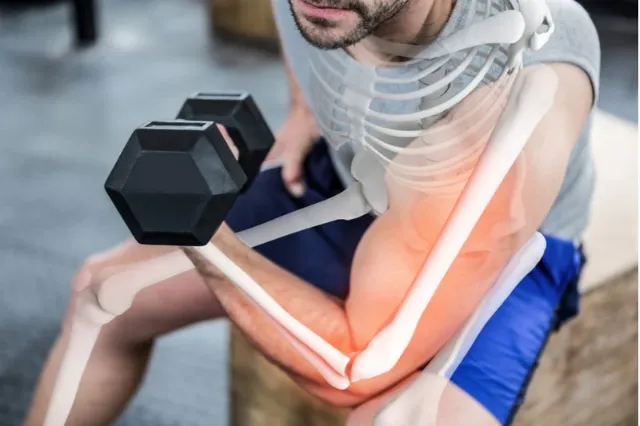Strong bones are crucial for maintaining a healthy and active lifestyle. As we age, our bones naturally become weaker, but there are steps we can take to prevent this from happening or slow down the process. In this article, we will discuss some easy ways to have strong bones.
5 Easy Ways to Boost Your Bone Strength
1. Eat a balanced diet
One of the most important factors in having strong bones is to eat a balanced diet that is rich in nutrients such as calcium, vitamin D, and protein. Calcium is the main building block of bones, and vitamin D helps the body absorb calcium. Protein is also essential for maintaining strong bones and muscles.
Foods that are rich in calcium include dairy products such as milk, cheese, and yogurt, as well as leafy green vegetables like kale and broccoli. Vitamin D can be obtained from exposure to sunlight and from foods such as fatty fish, egg yolks, and fortified foods like milk and cereal. Good sources of protein include lean meats, fish, beans, and nuts.
2. Get enough exercise
Exercise is also important for maintaining strong bones. Weight-bearing exercises like walking, jogging, and dancing can help improve bone density and prevent bone loss. Strength training exercises like lifting weights can also help build and maintain strong bones and muscles.
It is recommended to engage in at least 30 minutes of moderate-intensity exercise on most days of the week. This can include activities like brisk walking, cycling, or swimming. It's also important to mix up your exercise routine to include a variety of activities that work for different muscle groups.
3. Quit smoking and limit alcohol consumption
Smoking and excessive alcohol consumption can both contribute to weaker bones. Smoking can decrease bone density and increase the risk of fractures, while excessive alcohol consumption can interfere with the body's ability to absorb calcium and other nutrients.
If you smoke, quitting smoking is one of the best things you can do for your bone health. If you consume alcohol, it's important to do so in moderation. This means no more than one drink per day for women and no more than two drinks per day for men.
4. Get enough sleep
Getting enough quality sleep is also important for maintaining strong bones. During sleep, the body repairs and rebuilds bone tissue. Chronic sleep deprivation can interfere with this process and lead to weaker bones over time.
Most adults need between 7 and 9 hours of sleep per night. To improve the quality of your sleep, establish a regular sleep routine, avoid caffeine and alcohol before bedtime, and create a comfortable sleep environment.
5. Consider supplements
In some cases, it may be necessary to take supplements to ensure adequate intake of certain nutrients that are important for bone health. Calcium and vitamin D supplements are commonly recommended for people who are not getting enough of these nutrients from their diet or sun exposure.
It's important to talk to your doctor or a registered dietitian before taking any supplements, as they can interact with medications and other health conditions.
Several exercises that can help improve bone strength:
Weight-bearing exercises: These exercises involve putting weight on your bones and can help improve bone density. Examples include walking, jogging, hiking, stair climbing, dancing, and tennis.
Resistance exercises: These exercises involve using weights or resistance bands to strengthen your muscles and bones. Examples include weight lifting, push-ups, squats, and lunges.
Balance and coordination exercises: These exercises help improve your balance and reduce the risk of falls, which can lead to fractures. Examples include yoga, tai chi, and Pilates.
High-impact exercises: These exercises involve jumping or other high-impact movements that can help improve bone density. Examples include jumping jacks, plyometrics, and high-intensity interval training (HIIT).
It's important to note that not all exercises are suitable for everyone, especially those with certain medical conditions or injuries. It's always a good idea to consult with a doctor or a qualified fitness professional before starting a new exercise program, especially if you have concerns about your bone health.
Having strong bones is important for maintaining a healthy and active lifestyle, especially as we age. By eating a balanced diet, getting enough exercise, quitting smoking, limiting alcohol consumption, getting enough sleep, and considering supplements if necessary, you can help keep your bones strong and healthy for years to come. Remember to talk to your doctor or a registered dietitian if you have any concerns about your bone health.
There are several factors that can contribute to weak bones, including:
Age: As we get older, our bones naturally become weaker and less dense, making them more susceptible to fractures.
Gender: Women are more likely to develop weak bones than men, especially after menopause when estrogen levels decrease.
Genetics: Some people may be more prone to weak bones due to their genetic makeup.
Hormonal imbalances: Certain hormonal imbalances, such as low levels of estrogen or testosterone, can contribute to weak bones.
Nutritional deficiencies: A lack of calcium, vitamin D, and other nutrients essential for bone health can lead to weak bones.
Medical conditions: Certain medical conditions, such as osteoporosis, rheumatoid arthritis, and celiac disease, can contribute to weak bones.
Medications: Some medications, such as corticosteroids and certain anticonvulsants, can weaken bones over time.
Lifestyle factors: Smoking, excessive alcohol consumption, a sedentary lifestyle, and chronic stress can all contribute to weak bones.
It's important to note that bone health is complex and can be influenced by a variety of factors, and not all of these factors are within our control. However, making lifestyle changes such as eating a balanced diet, getting enough exercise, and avoiding smoking and excessive alcohol consumption can help improve bone health and reduce the risk of fractures.




